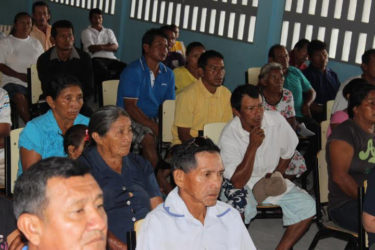Residents of several villages in the Rupununi District have been called upon to exercise accountability and independence when undertaking community-based projects in keeping with the Ministry of Indigenous Peoples Affairs Sustainable Deve-lopment Framework Agreement (SDFA).
According to a statement issued by the ministry, several of the more than 30 villages in the Rupununi were briefed on aspects of the SDFA during a week-long visit to Region Nine by staff of the ministry and programme partner Conservation Inter-national (CI) Guyana.

Set to create viable economies within villages and communities, the SDFA will require villages to produce a long-term (10-year) Community Development Plan (CDP), where programmatic areas will be outlined and projects and targets prioritized based on the respective CDPs coupled with an effective feedback mechanism.
Acknowledging its partner in this process, the ministry said CI Guyana continues to offer considerable support for the initiative with the aim of ensuring indigenous villages are strategically positioned on a sustainable developmental path.
Meanwhile, during a village meeting in Sand Creek last Thursday Project Coordinator in the Ministry of Indigenous Peoples Affairs Jude Da Silva reiterated the need for communities to become more accountable and self-sufficient, hence the drive in this regard.
Stressing the importance of coordination, he told the stakeholders that this would see the money received used towards the best kind of investment.
A number of villages in the region have already successfully completed their long-term plan, the statement said. It quoted CI’s Community Develop-ment Assistant Kayla de Freitas as saying, “Work will soon begin on completing their annual village plans, which will be extracted from plans outlined in the CDP to be implemented during the coming year.”
Further, the statement underscored the need for villages to submit their proposals to the Ministry of Indigenous Peoples Affairs by May of every year together with a proposal for funding. The same timeline will be instituted for projects that are to be submitted to other government agencies.
Technical Coordinator for CI’s Livelihood Enhancement Project in the Rupununi Rene Edwards emphasized the need for the implementation of such mechanisms aimed at improving the social and economic livelihood within village economies.
Edwards noted that changes have occurred over time, one of which was “the introduction of money into the way of life of village economies…”
According to the statement, he also noted that customs involving land, languages, traditional practices, culture, laws and institution remained strong. “We don’t want to disrupt that but to build on these things and what you want to be and where you see yourselves going in the future and how you want to do it and how you can manage the change that is happening here,” he was quoted as saying.
During the launch of the programme early last month, Minister of Indigenous Peoples Affairs Sydney Allicock noted that the policy framework would ensure efficient and effective financial and technical support directed to the villages for social, economic and cultural development.
“Villages will be in a position to know what their annual priority projects are and send it to the ministry and the REO in time to be placed into the ministry’s and RDC’s annual budgets,” Allicock had said.




